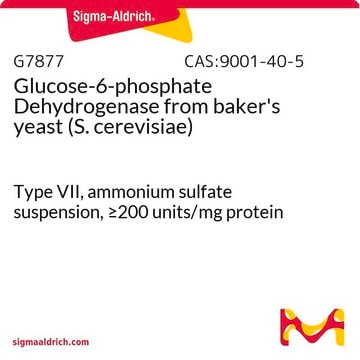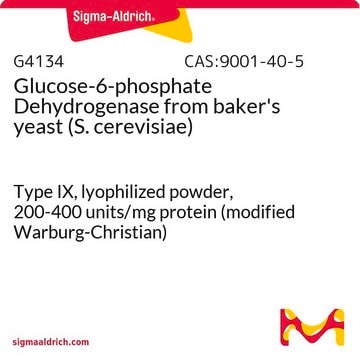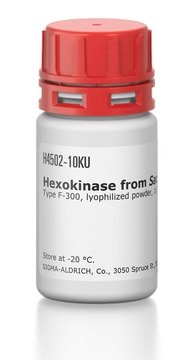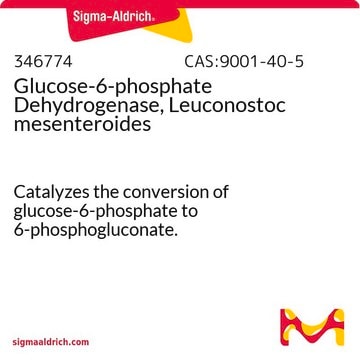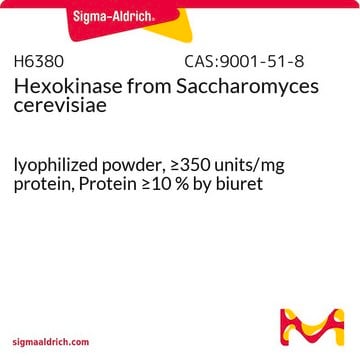G8404
Glucose-6-phosphate Dehydrogenase from Leuconostoc mesenteroides
recombinant, expressed in E. coli, ammonium sulfate suspension, ≥550 units/mg protein (biuret)
Synonyme(s) :
Entner-Doudoroff enzyme, G6PD, G6PDH, NADP glucose 6-phosphate dehydrogenase, G-6-P-DH
About This Item
Produits recommandés
Source biologique
bacterial (Leuconostoc mesenteroides)
Niveau de qualité
Produit recombinant
expressed in E. coli
Forme
ammonium sulfate suspension
Activité spécifique
≥550 units/mg protein (biuret)
Poids mol.
128 kDa
Conditions de stockage
(Tightly closed)
Technique(s)
cell culture | mammalian: suitable
Numéro d'accès UniProt
Activité étrangère
creatine phosphokinase, glutathione reductase, myokinase, NADH oxidase, NADPH oxidase, phosphoglucomutase, 6-phosphogluconic dehydrogenase, phosphoglucose isomerase, lactic dehydrogenase, hexokinase ≤0.01%
Température de stockage
2-8°C
Vous recherchez des produits similaires ? Visite Guide de comparaison des produits
Catégories apparentées
Description générale
Research area: Cell Signaling
Application
- to test ketose reductase activity in developing maize endosperm.
- to determine the levels of mannose in coronary heart disease patient-derived serum
- to study its activity on extracellular polymeric substance (EPS) extract to determine cell lysis through sonication
- to determine the glucose uptake in cultured human muscle satellite cells
Actions biochimiques/physiologiques
Définition de l'unité
Forme physique
Produit(s) apparenté(s)
Code de la classe de stockage
12 - Non Combustible Liquids
Classe de danger pour l'eau (WGK)
WGK 2
Point d'éclair (°F)
Not applicable
Point d'éclair (°C)
Not applicable
Équipement de protection individuelle
Eyeshields, Gloves, type ABEK (EN14387) respirator filter
Certificats d'analyse (COA)
Recherchez un Certificats d'analyse (COA) en saisissant le numéro de lot du produit. Les numéros de lot figurent sur l'étiquette du produit après les mots "Lot" ou "Batch".
Déjà en possession de ce produit ?
Retrouvez la documentation relative aux produits que vous avez récemment achetés dans la Bibliothèque de documents.
Les clients ont également consulté
Articles
Instructions for working with enzymes supplied as ammonium sulfate suspensions
Protocoles
To measure glucose-6-phosphate dehydrogenase activity, beta-nicotinamide adenine dinucleotide phosphate is used in a spectrophotometric rate determination assay at 340 nm.
Notre équipe de scientifiques dispose d'une expérience dans tous les secteurs de la recherche, notamment en sciences de la vie, science des matériaux, synthèse chimique, chromatographie, analyse et dans de nombreux autres domaines..
Contacter notre Service technique

